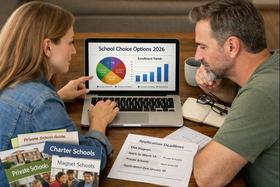Serving 123 students in grades Kindergarten-6, Horizon Science Academy Twin Cities ranks in the bottom 50% of all schools in Minnesota for overall test scores (math proficiency is bottom 50%, and reading proficiency is bottom 50%).
The percentage of students achieving proficiency in math is ≤20% (which is lower than the Minnesota state average of 46%). The percentage of students achieving proficiency in reading/language arts is 11-19% (which is lower than the Minnesota state average of 51%).
The student-teacher ratio of 12:1 is lower than the Minnesota state level of 13:1.
Minority enrollment is 97% of the student body (majority Black), which is higher than the Minnesota state average of 39% (majority Black).
Quick Facts (2026)
- School Type: Charter School
- Grades: Kindergarten-6
- Enrollment: 123 students
- Student-Teacher Ratio: 12:1
- Minority Enrollment: 97%
- Overall Testing Rank: Bottom 50% in MN
- Math Proficiency: ≤20% (Btm 50%)
- Reading Proficiency: 11-19% (Btm 50%)
- Science Proficiency: <50% (Top 30%)
- Source: National Center for Education Statistics (NCES), MN Dept. of Education
Top Rankings
Horizon Science Academy Twin Cities ranks among the top 20% of public schools in Minnesota for:
Category
Attribute
Percent Eligible For Free Lunch
School Overview
Horizon Science Academy Twin Cities's student population of 123 students has grown by 44% over five school years.
The teacher population of 10 teachers has grown by 25% over five school years.
School Type
Grades Offered
Grades Kindergarten-6
(No virtual instruction)
(No virtual instruction)
Total Students
123 students
Gender %
Total Classroom Teachers
10 teachers
School Rankings
Horizon Science Academy Twin Cities ranks within the bottom 50% of all 1,773 schools in Minnesota (based off of combined math and reading proficiency testing data).
The diversity score of Horizon Science Academy Twin Cities is 0.17, which is less than the diversity score at state average of 0.59. The school's diversity has stayed relatively flat over five school years.
Overall Testing Rank
#1635 out of 1773 schools
(Bottom 50%)
(Bottom 50%)
Math Test Scores (% Proficient)
≤20%
46%
Reading/Language Arts Test Scores (% Proficient)
11-19%
51%
Science Test Scores (% Proficient)
<50%
41%
Student-Teacher Ratio
12:1
13:1
American Indian
n/a
2%
Asian
n/a
7%
Hispanic
6%
12%
Black
91%
12%
White
3%
61%
Hawaiian
n/a
n/a
Two or more races
n/a
6%
All Ethnic Groups
Participates in the National School Lunch Program (NSLP)
Yes
Eligible for Free Lunch
34%
36%
Eligible for Reduced Lunch
2%
7%
School Statewide Testing
School District Name
Source: National Center for Education Statistics (NCES), MN Dept. of Education
Profile last updated: 02/09/2025
Frequently Asked Questions
What is Horizon Science Academy Twin Cities's ranking?
Horizon Science Academy Twin Cities is ranked #1635 out of 1,773 schools, which ranks it among the bottom 50% of public schools in Minnesota.
What percent of students have achieved state testing proficiency in math and reading?
≤20% of students have achieved math proficiency (compared to the 46% MN state average), while 11-19% of students have achieved reading proficiency (compared to the 51% MN state average).
How many students attend Horizon Science Academy Twin Cities?
123 students attend Horizon Science Academy Twin Cities.
What is the racial composition of the student body?
91% of Horizon Science Academy Twin Cities students are Black, 6% of students are Hispanic, and 3% of students are White.
What is the student-teacher ratio of Horizon Science Academy Twin Cities?
Horizon Science Academy Twin Cities has a student ration of 12:1, which is lower than the Minnesota state average of 13:1.
What grades does Horizon Science Academy Twin Cities offer ?
Horizon Science Academy Twin Cities offers enrollment in grades Kindergarten-6 (No virtual instruction).
What school district is Horizon Science Academy Twin Cities part of?
Horizon Science Academy Twin Cities is part of Horizon Science Academy Twin Cities School District.
School Reviews
Review Horizon Science Academy Twin Cities. Reviews should be a few sentences in length. Please include any comments on:
- Quality of academic programs, teachers, and facilities
- Availability of music, art, sports and other extracurricular activities
Recent Articles

Back-to-School Tech & Online Learning Readiness Checklist
A 2026 guide to back-to-school tech & online learning readiness, helping families prepare devices, connectivity, skills, and safety.

How Public Schools Prepare for College in High School
Learn how public schools prepare for college and what parents should look for as students begin high school. Updated for 2026.

School Choice in 2026: What Parents Must Know
Explore how school choice is reshaping U.S. education in 2026, with updated trends, enrollment data, costs, policies, and practical guidance for parents.






